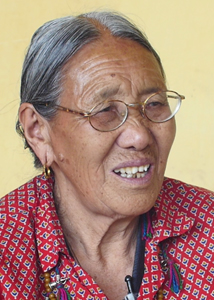Name: Samten Dolma
(Alias: No)
Gender: Female
Interview Age: 83
Date of Birth: 1934
Birthplace: Tengyal Gyangkhar, Utsang, Tibet
Year Left Tibet: 1957
Profession: Farming
Monk/Nun: No
Political Prisoner: No

Interview No.: 14U
Date: 2017-04-02
Language: Tibetan
Location: Rajpur, Uttarakhand, India
Categories: Culture and History
Keywords: childhood memories, customs/traditions, farm life, poor/lower class, refugee in India -- life as, taxes, trade, Utsang
Summary:
Samten Dolma was born in 1934 in Tengyal Gyangkhar, Utsang Province. Her parents had five children and worked as farmers. They had to work before dawn in their own fields and after daybreak they had to perform a labor tax by working at the local leader's farm. Most of the families lived in single-story homes made of stone and mud, while the leader had a three-story house. Samten Dolma recalls a caste system in which the animal slaughterer and blacksmith were considered low caste and were treated differently from the others.
Samten Dolma began transporting goods like fabric, tea, and sugar to earn money. She carried the heavy loads on her back from India to Tibet. After the Chinese invasion, prices for goods dropped significantly and she and her younger sister chose to stay in India to work as coolies. While her sister later returned home to Tibet, Samten Dolma remained in India trying to work off the loan she took out to support her sister's journey.
Samten Dolma met her husband and they continued to work as coolies until he joined the army. In 1962 Samten Dolma joined the Tibetan Women's Centre in Rajpur and worked hard to raise her children and care for her husband.
Interview Team:
- Marcella Adamski (Interviewer)
- Tenzin Yangchen (Interpreter)
- Tenzin Choenyi (Videographer)

